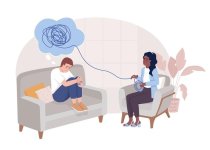psychologicalbark05
New member
In a world where everyone seems to be chasing perfection, mental health is often quietly ignored. We talk about grades, jobs, fitness, relationships — but we rarely talk about therapy. For many, the idea of seeing a therapist still feels like something to be ashamed of. But here’s the truth: therapy isn’t a sign of weakness — it’s a step toward healing, understanding, and growth.
We all go through things. Some experiences are loud and dramatic, others are quiet and invisible. Family pressure, academic failure, toxic friendships, heartbreak, confusion about the future — these are all heavy things to carry alone. And yet, so many people are expected to “deal with it” or “move on” without help. That’s where therapy comes in. It's not magic, and it doesn't erase pain overnight. But it gives you a space where you can feel heard, without being judged or interrupted. And sometimes, that’s all we need.
There’s also a big misunderstanding that only people with depression, anxiety, or trauma need therapy. But therapy isn’t only about crisis. It’s about understanding yourself better, learning to cope with emotions, and building healthier habits and thoughts. Just like we go to a doctor for regular checkups, we can see a therapist to stay emotionally healthy.
In many Indian families, therapy is still taboo. It’s seen as something “crazy people” do — a line that’s used too often and completely wrong. The truth is, everyone has struggles. Everyone has a story. And it’s okay to ask for help. In fact, it’s brave.
Therapy is also important because it teaches us to set boundaries, communicate better, and build kinder relationships — with others and with ourselves. In a time when social media makes everyone feel like they have to be “okay” all the time, therapy reminds us that it’s okay not to be okay.
It’s time we normalize going to therapy the same way we talk about gym, skincare, or study routines. Talking to someone doesn’t make your problems go away, but it gives you the tools to face them. And that is powerful.
If we want a healthier, kinder, more self-aware generation, we need to start with conversations. Therapy should not be the last resort — it should be an option that’s open, respected, and encouraged.
We all go through things. Some experiences are loud and dramatic, others are quiet and invisible. Family pressure, academic failure, toxic friendships, heartbreak, confusion about the future — these are all heavy things to carry alone. And yet, so many people are expected to “deal with it” or “move on” without help. That’s where therapy comes in. It's not magic, and it doesn't erase pain overnight. But it gives you a space where you can feel heard, without being judged or interrupted. And sometimes, that’s all we need.
There’s also a big misunderstanding that only people with depression, anxiety, or trauma need therapy. But therapy isn’t only about crisis. It’s about understanding yourself better, learning to cope with emotions, and building healthier habits and thoughts. Just like we go to a doctor for regular checkups, we can see a therapist to stay emotionally healthy.
In many Indian families, therapy is still taboo. It’s seen as something “crazy people” do — a line that’s used too often and completely wrong. The truth is, everyone has struggles. Everyone has a story. And it’s okay to ask for help. In fact, it’s brave.
Therapy is also important because it teaches us to set boundaries, communicate better, and build kinder relationships — with others and with ourselves. In a time when social media makes everyone feel like they have to be “okay” all the time, therapy reminds us that it’s okay not to be okay.
It’s time we normalize going to therapy the same way we talk about gym, skincare, or study routines. Talking to someone doesn’t make your problems go away, but it gives you the tools to face them. And that is powerful.
If we want a healthier, kinder, more self-aware generation, we need to start with conversations. Therapy should not be the last resort — it should be an option that’s open, respected, and encouraged.


